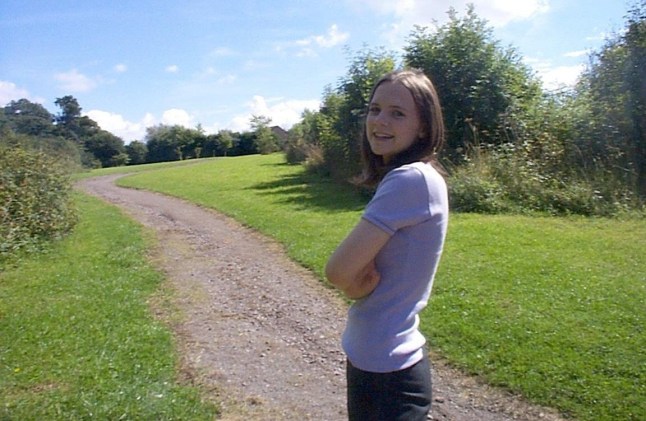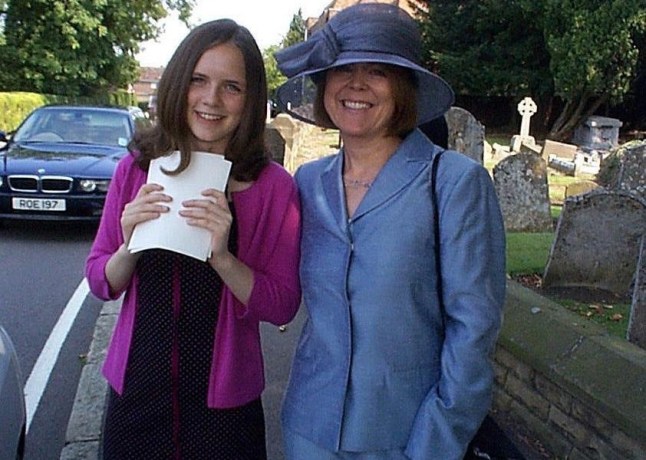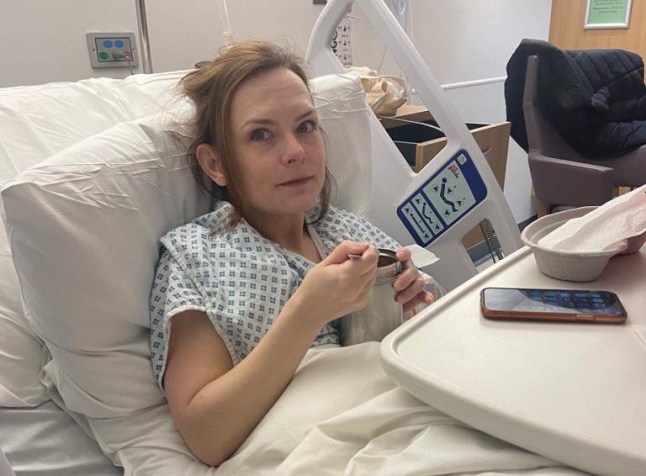
Lots of people say that your first time might hurt ‘a bit’.
But when I lost my virginity at 17 it was agony.
It felt like everything inside me was burning and being pulled apart. I remember tensing my whole body, gritting my teeth, wanting it to stop.
And the moment my boyfriend finished, I thought: ‘I never want to do that again.’
I have of course had sex since, but it has always been an ordeal rather than a pleasure. I have always experienced anxiety or dread at the prospect of sex, if it gets to that point of feeling like I can’t make another excuse to a partner.
For years I wondered why I couldn’t enjoy sex in the same way my friends did but it was only in 2019, after turning 35, that I got my answer: I have endometriosis.
My symptoms started with my first period at the age of 13.
Not only was it incredibly heavy – leading me to wear multiple sanitary pads because I was scared of leaking – but I wound up bed bound for days due to severe pain both in my pelvic region, lower back and when using the toilet.

Each month the symptoms were the same and I soon began to dread my period’s arrival.
Knowing this wasn’t normal, I decided to speak to my GP with my mum. At that first appointment I was told I wasn’t special, and that painful periods were a part of life. But I knew something was wrong.
However, no matter how many appointments I booked – sometimes as many as 10 times a year – my concerns were usually dismissed as me being overdramatic, or they’d suggest it must be irritable bowel syndrome (IBS).
Sometimes, I’d have blood tests or be suggested various medications, but nothing ever worked. At no point during those 22 years, did a doctor ever recommend that I see a gynaecologist.
I even had one doctor tell me I was just ‘attention seeking’.
If that was the case then why, when I was 15, did I spend an evening sitting on the toilet, crying in pain, wishing for a hysterectomy?

The whole ordeal made me miserable, so much so that at 16, I was prescribed antidepressants. They didn’t help at all, they just made me feel more isolated – and there was a lot more stigma around mental health then, so I was unable to talk about it.
I always thought my first time would be painful, but when the second, third, and fourth were still as painful, I realised that sex for me was going to be distressing, not enjoyable.
But still, I just wanted to be a normal teenager, who had a ‘normal’ sex life with my boyfriend, despite my first experience.
So, I started faking orgasms. I just wanted to get sex over with as quickly as possible, and then run to the toilet to curl up in a ball, waiting for the pain to pass. I was too embarrassed to talk to my boyfriend about what I was experiencing, in case he saw me as broken, so I would make excuses.
And when I mentioned it to friends in passing, they brushed it off as pain from first-time sex.

As I got older, I began to feel more confident discussing the pain with my partners. But I still didn’t know what was wrong with me, I didn’t have a diagnosis, with the exception of IBS, so it was quite difficult to get them to understand the severity of the symptoms.
And some boyfriends even thought I was still making excuses.
Usually, we had to stop part way through sex, and then, after a while, we just stopped trying altogether. And that’s when, sadly, I learned the hard way that a relationship without sex isn’t much of a relationship at all.
I’ve often felt very lonely, spending most of my adult life single. Dating with a chronic condition is extremely challenging – I have a fear of rejection, and feel anxious thinking about having to share my health challenges with someone for the first time, all over again.
All the while doctors were still struggling to give me any real answers.
Nobody, not even the nurses after seeing me in that much pain during cervical cancer screenings, told me that I was allowed to ask for a longer appointment, without any rushing, or to ask for a smaller speculum to help reduce that pain.
Nor do I believe they ever recorded my more than mild discomfort in my notes.
I’d already spent my teens feeling like no one believed me, and right through my twenties, I never got the sense that had changed. I often felt like I was being gaslit, ignored and disregarded.
Not even when I got pregnant in 2013 at 29, only to heartbreakingly miscarriage at 12 weeks, did it raise any red flags.
It wasn’t until six years later, while having an open chat with a supportive colleague at work, that I learned other women have experienced these symptoms too.

‘That sounds like what my wife has’, he said, ‘It’s called endometriosis.’
I sat down with his wife, and we exchanged what we called ‘war stories’. I found that almost all of our symptoms matched up, it was like a weight had been lifted when I finally realised I wasn’t alone.
After that, I immediately arranged to see a gynaecologist privately.
We talked for a grand total of 15 minutes before he told me he was 99% certain it was endometriosis.
Fifteen minutes!
I couldn’t believe it. After spending 22 years with awful symptoms, a 15-minute chat was all it took for someone to work out what was going on. Not long after, I was formally diagnosed. I felt simultaneously elated and infuriated.
Endometriosis is a common menstrual health condition. It impacts one in 10 women and those assigned female at birth and is the second most common gynaecological condition in the UK.
How then, could my symptoms have been missed for all this time? It didn’t make sense.

But then I learned that it takes, on average, 8 years and 10 months from the first GP visit to get a diagnosis; and it’s even higher in Wales, where I live. My case obviously took longer than the national average, but that has to change.
Still, as angry as I was that it took so long to receive the diagnosis, all I wanted to do now was move forward.
In February 2020 I had my first surgery, which confirmed and removed the presence of deep infiltrating endometriosis – it is a rare and severe form of endometriosis that occurs when tissue similar to the lining of the uterus, grows deep into nearby organs. It can affect the bladder, bowel, reproductive system, and other organs.
Sadly, this grew back within six months, and I had two more surgeries the following year to attempt to clear it again.
During the third surgery it was also discovered that I have adenomyosis – a condition like endometriosis, but where tissue grows into the lining of the uterus.
Learn more about endometriosis
Endometriosis means that cells similar to those in the lining of the womb start to grow elsewhere in the body; potentially impacting the ovaries, fallopian tubes, bladder and bowel.
Symptoms can include:
- Severe period pain
- Heavy periods (resulting in the need to change pads or tampons every 1-2 hours)
- Pain when pooing or peeing
- Pain in the pelvic area (lower tummy and back)
- Pain during or after sex
- Extreme fatigue (tiredness)
You can find out more about endometriosis via the NHS website here.
Though pain management and physio provided some relief, the pain was getting so intense that I struggled with daily activities like walking the dog or even walking up the stairs, so eventually I decided to have a total hysterectomy in April 2022. After that, I finally felt that my battle with endometriosis had come to an end.
There have been other battles since – I’ve been in surgical menopause ever since the hysterectomy, which has led to brain fog, arthritis, hot flushes, anxiety and vaginal atrophy (a thinning, drying and inflammation of the vaginal walls, which can occur when you’ve not got enough oestrogen) – but I am gradually improving with HRT.
Annoyingly, surgeons and doctors have all agreed that my endometriosis should have been caught much earlier. If it had, then it wouldn’t have infiltrated so many areas of my body and would have allowed me to make proper choices about preserving my fertility.
I’m also frustrated because I feel like endometriosis has robbed me of what could have been some wonderful and important life experiences, both sexually and in other areas.
There is hope though. As I continue to navigate my life post hysterectomy, I believe I will be able to have a healthy, stable and intimate relationship in the future.
Now all I want to see is more awareness and understanding.
For a start, warnings about painful sex should be taught as part of sex education classes at school. That way young girls will know it’s not normal and be able to speak up as soon as possible.
More Trending
We also need to encourage doctors and nurses to ask more than the standard ‘are you sexually active or not’ questions.
Ask if sex is painful and to what degree. Yes, it’s a sensitive topic, but the embarrassment of having that conversation would be far less upsetting than the years of agony your patient might be going through.
Most of all, if you are a young woman who is experiencing these symptoms – including excruciatingly painful sex – please speak up about it.
Get the rest you deserve
I promise, you are not to blame, you’re not making it up, and you are definitely not alone.
Do you have a story you’d like to share? Get in touch by emailing jess.austin@metro.co.uk.
Share your views in the comments below.
MORE: I’m an overwhelmed mum-of-four with endometriosis — sex is challenging
MORE: I knew we were soulmates from the moment I gave him a lap dance
MORE: I didn’t realise giving my builder painkillers could land me in jail














